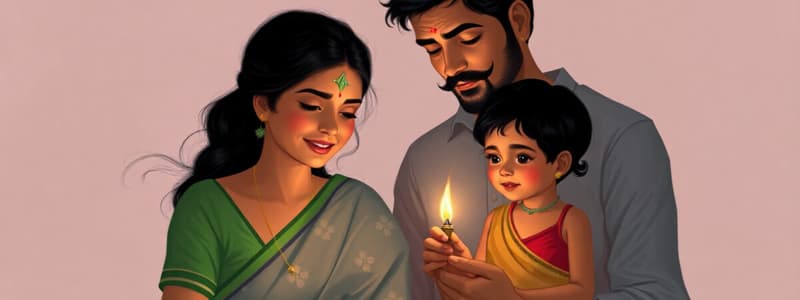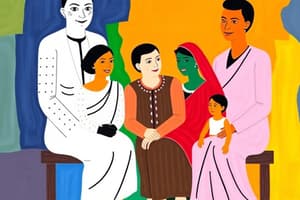Podcast
Questions and Answers
What does Shalini's family do to support each other during the festival of Onam?
What does Shalini's family do to support each other during the festival of Onam?
- They skip buying new clothes altogether.
- They buy only for themselves.
- They only buy new clothes for Shalini.
- They buy new clothes for the entire family. (correct)
Which skill or activity is Tenzing's mother involved in?
Which skill or activity is Tenzing's mother involved in?
- Making traditional handicrafts. (correct)
- Running a grocery store.
- Caring for the household.
- Helping with homework.
What did Shalini have to settle for instead of her expected silk dress?
What did Shalini have to settle for instead of her expected silk dress?
- A simple cotton dress. (correct)
- An old dress from her mother.
- A traditional dress.
- Nothing at all.
How does Tenzing's grandfather contribute to the community?
How does Tenzing's grandfather contribute to the community?
What important lesson does Tenzing's mother share about financial management?
What important lesson does Tenzing's mother share about financial management?
What is the primary difference between a joint family and a nuclear family?
What is the primary difference between a joint family and a nuclear family?
Which term is NOT commonly used in Indian languages to describe familial relationships?
Which term is NOT commonly used in Indian languages to describe familial relationships?
What is one of the key principles of family life emphasized in Indian culture?
What is one of the key principles of family life emphasized in Indian culture?
What do children learn from participating in family life according to the content?
What do children learn from participating in family life according to the content?
What important values do children learn through family experiences?
What important values do children learn through family experiences?
Flashcards are hidden until you start studying
Study Notes
Family Structures in India
- Traditional Indian society includes joint families, extended family households with multiple generations living together
- Nuclear families are becoming increasingly common in urban areas, consisting of a couple and their children
- Indian languages have many words to describe family relationships, including specific terms for aunts, uncles, and cousins
- In many Indian languages, there is no single word for "cousin," as cousins are considered "brothers" and "sisters," highlighting the close bonds within the family
Family Values and Responsibilities
- Family relationships are based on love, care, cooperation, and interdependence.
- Roles and responsibilities are shared among family members, with parents responsible for raising children, and children taking on responsibilities as they grow.
- Dharma, or duty, is an important principle in Indian culture, with individuals often putting family needs before their own.
Example Stories
- Shalini's family in Kerala demonstrates the importance of family support, with her parents taking care of her uncle's family's clothing costs during Onam.
- Tenzing's family in Meghalaya highlights the shared responsibilities and values in their family, with his father helping with household chores and his grandmother sharing wisdom and stories.
- Tenzing's grandfather contributes to the community by helping neighbours and participating in social work.
Financial Management
- The importance of saving money for unexpected expenses is emphasized.
- Families often discuss and plan for financial needs together to ensure security and well-being.
Studying That Suits You
Use AI to generate personalized quizzes and flashcards to suit your learning preferences.




